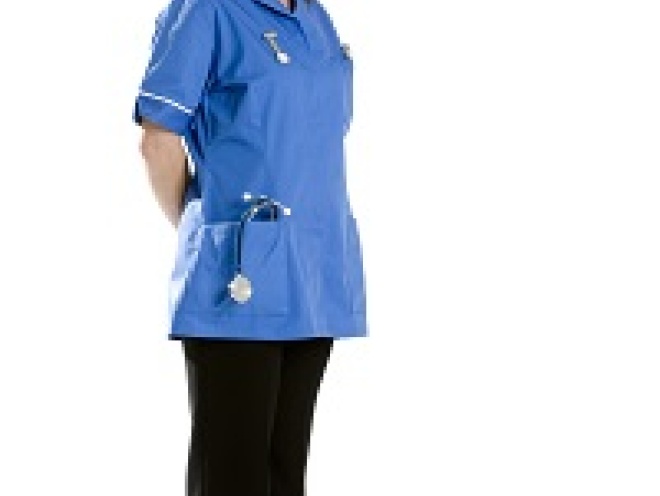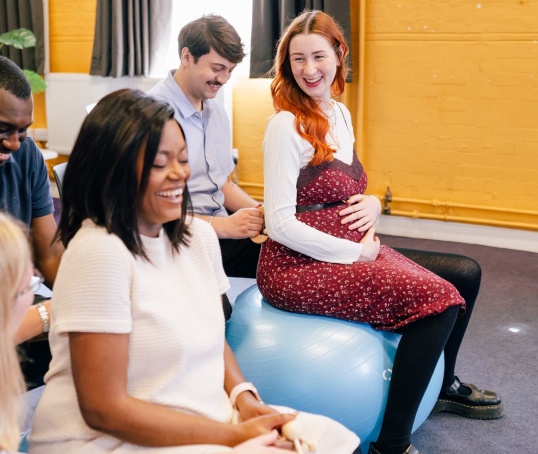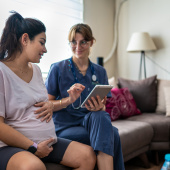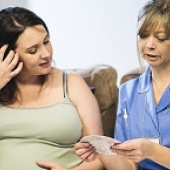For most women, pregnancy healthcare is a total unknown. Here’s a handy guide to who you’ll be chatting to for the next nine months…
Midwife
Whatever type of pregnancy you have, you’ll see your midwife a fair few times. A midwife (or a number of midwives) will take care of you when you’re pregnant, during labour and after your baby arrives. Then they’ll hand you over to your next pregnancy guardian: your health visitor.
Health visitor
Your health visitor will first pop along to your home to introduce themselves when you’re pregnant (NHS, 2015a). Put the kettle on because maybe they’ll stay for a drink, chat through some information and tell you about the postnatal clinics that’ll weigh your baby when they’re born (NHS 2015a; Scottish Government, 2015; NHS Wales, 2016). Then you won’t see them again for a little while – until your midwife discharges you after your baby is born.
GP
While you’re pregnant, you’ll still see your GP for anything non-baby related. If your baby was born at home then your GP may conduct the newborn (NIPE) check (NHS, 2015b).
Your GP will also be involved when they give you your six-week check after you have the baby. This check involves talk through how you are feeling physically and mentally, checking any stitches or caesarean scar and talking about issues like contraception (NHS, 2016a).
Sonographer
Ah, the emotional part. The sonographer will carry out the scan or scans that you’ll be offered during pregnancy to see how your baby is growing and developing.
Dietician
Not one that most people will see but they may come in if you have gestational or normal diabetes. If so, they’ll give you support with healthy eating during your pregnancy (NHS, 2015a).
Anaesthetist
If you have an epidural during labour, the anaesthetist will give the injection (NHS, 2015a). They’ll also give the pain relief during other types of birth, including caesareans, too (NHS, 2015a).
Neonatal nurses
If your baby needs to go to special care, specialist neonatal nurses will look after them (NHS, 2015c).
Obstetrician
An obstetrician is a doctor who specialises in complicated pregnancies and childbirth (NHS, 2015a). If your midwife thinks it’s needed, they will refer you to an obstetrician for more tests or treatment. Obstetricians also take charge of forceps or ventouse births as well as caesareans (NHS, 2015a).
Obstetric or pregnancy physiotherapist
Joint or muscle pain can be a common complaint in pregnancy and, if you’re suffering, your midwife might refer you to an obstetric physiotherapist (NHS, 2015a). After the birth, pregnancy physiotherapists can support women with continence problems too (NHS, 2016b).
Paediatrician/neonatologist
A doctor who specialises in babies and children is a paediatrician. A doctor who specialises in the first six weeks of a child’s life is a neonatologist (NHS, 2015c). They may be present at more complicated births, and they will lead the care that takes place in the neonatal unit too (NHS, 2015c).
This page was last reviewed in September 2017.
Further information
Our support line offers practical and emotional support with feeding your baby and general enquiries for parents, members and volunteers: 0300 330 0700.
We also offer antenatal courses which are a great way to find out more about birth, labour and life with a new baby.
NHS. (2015a) Antenatal support, meet the team. Available from: http://www.nhs.uk/conditions/pregnancy-and-baby/pages/antenatal-team-midwife-obstetrician-pregnant.aspx [Accessed 19th September 2017]
NHS. (2015b) Newborn physical examination. Available from: http://www.nhs.uk/Conditions/pregnancy-and-baby/Pages/newborn-physical-exam.aspx [Accessed 19th September 2017]
NHS. (2015c) Special care: ill or premature babies. Available from: http://www.nhs.uk/Conditions/Incontinence-urinary/Pages/Treatment.aspx [Accessed 19th September 2017]
NHS. (2016a) Your six-week postnatal check. Available from: http://www.nhs.uk/Conditions/pregnancy-and-baby/Pages/postnatal-check.aspx [Accessed 19th September 2017]
NHS. (2016b) Urinary incontinence – non-surgical treatment. Available from: http://www.nhs.uk/Conditions/Incontinence-urinary/Pages/Treatment.aspx [Accessed 19th September 2017]
NHS Wales. (2016) An overview of the health child Wales programme. Available from: http://gov.wales/docs/dhss/publications/160926healthy-childrenen.pdf [Accessed 19th September 2017]
Scottish Government. (2015) Universal Health Visiting Pathway in Scotland. Available from: http://www.gov.scot/Publications/2015/10/9697/1 [Accessed 19th September 2017]





